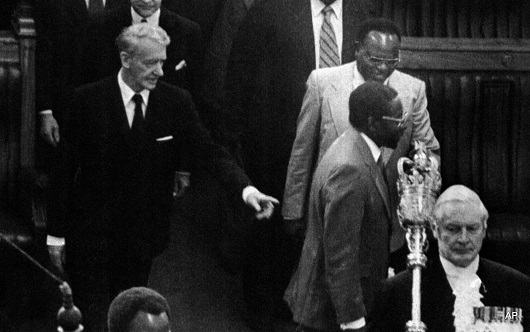
About Andrew Cusack
 Writer, web designer, etc.; born in New York; educated in Argentina, Scotland, and South Africa; now based in London.
Writer, web designer, etc.; born in New York; educated in Argentina, Scotland, and South Africa; now based in London. read more
News
Blogs
Reviews & Periodicals
Arts & Design
World
France
Mitteleuropa
Knickerbockers
Argentina
The Levant
Africa
Cape of Good Hope
Netherlands
Scandinavia
Québec
India
Muscovy
Germany
Academica
“Events did not choose the terrorists; powerful white people did.”
Helen Andrews on Zimbabwe

Robert Mugabe leading Ian Smith into the Zimbabwean parliament, 1980.
It is rare to find journalism as informed and insightful as this piece on Zimbabwe by Helen Andrews in National Review. In the aftermath of Mugabe’s clumsy downfall and his succession by a powerful apparatchik and experienced political operator, Helen explores the Rhodesian crisis and attempts to answer the question: could it really have gone any other way?
Any idea that liberal reform on the part of the Rhodesian state could have saved it is a non-starter, because the anti-imperialists were implacable and — I do not know a gentle way to put this — they were quite happy to lie. I do not mean just the professional liars of the Soviet propaganda shop, or the pundits who lazily referred to the Rhodesian system as “apartheid,” or the guerrillas who told Shona villagers that ZANU had successfully dynamited the Kariba Dam, or the foreign journalist who scattered candy around a garbage bin and captioned the resulting photo “Starving children searching for food in Salisbury.” Ralph Bunche had a doctorate from Harvard, a Nobel Peace Prize, and a co-author credit on the Universal Declaration of Human Rights, and when it came to imperialism, he lied.
“Colonial authorities like the noted Englishman, Lord Lugard, doubt that the African race, whether in Africa or America, can develop capability for self-government.” When I first read that in Bunche’s 1936 pamphlet “A World View of Race,” I felt a lurking suspicion that I had read a sentence of Lord Lugard’s beginning with the very words “The method of their progress toward self-government lies…” I had. His next words are “along the same path as that of Europeans.” Even making allowances for CTRL-F’s not having been invented yet, Bunche’s remark is plain slander. With Harvard Ph.D.s pulling stunts like this, it is hard to summon much indignation at a garden-variety diplomatic lie like the U.N. claim, by which sanctions were justified, that Rhodesia had committed an act of aggression by maintaining its status quo.
She does go a little easy on Smith, who despite his many strengths was just as willing to play fast and easy with the truth. (He was a politician, after all.) But then as we are so used to hearing that Smithie was a little Hitler it’s a welcome restorative.
When I moved to South Africa, I did so at least in part because I wanted to see it before it became “the next Zimbabwe”. Having come back, I was impressed by the relative robustness of many of its institutions, and the certain robustness of many of its people. Rather than a Zimbabwe-style collapse, South Africa seemed destined for a slow, ungainly descent into perpetual malaise.
The recent ascent of Cyril Ramaphosa – who on behalf of the ANC ran rings round the NP negotiators during the transition talks of the early ’90s – gives hope to many. I’m too cautious to be optimistic, but Mr Ramaphosa is clever, intelligent, skilful, and more likelier to keep the unions on side.
Search
Instagram: @andcusack
Click here for my Instagram photos.Most Recent Posts
- Silver Jubilee November 21, 2024
- Articles of Note: 11 November 2024 November 11, 2024
- Why do you read? November 5, 2024
- India November 4, 2024
- The Lithe Efficiency of the Old Constitution November 4, 2024
Most Recent Comments
Book Wishlist
Monthly Archives
Categories


